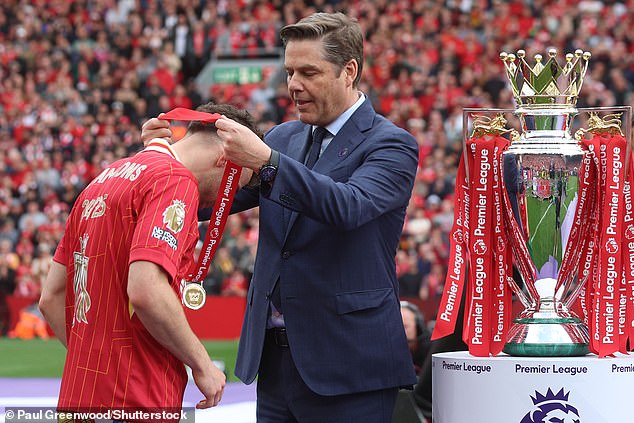Premier League clubs have voted against new highly controversial salary cap rules – but have green lit the introduction of new squad cost rules to replace the existing Profit and Sustainability Rules (PSR) from next season.
In a landmark meeting on Friday, top clubs have voted against ‘anchoring’ from 2026-27, which would have seen the amount any side could spend limited to five times the prize money and broadcast revenue paid to the club which finishes bottom.
This followed Daily Mail Sport’s reporting that an outraged Professional Footballers’ Association have threatened legal action – along with three of football’s biggest agencies telling the Premier League they will see them in court should they be introduced.
At the vote, anchoring received only seven votes in favour, with 12 against and one abstention. A threshold of 14 of the 20 clubs voting in favour of a proposal is required to change Premier League rules.
However, clubs have agreed to introduce a new set of financial rules, which will take effect from the start of the 2026–27 season – namely, the Squad Cost Ratio (SCR) and Systematic Resilience (SSR) proposals.
The vote for SCR passed, while SSR was approved unanimously.

Premier League clubs have voted against new highly controversial salary cap rules – but have green lit the introduction of new squad cost rules to replace the existing PSR regulations

Arsenal managing director Richard Garlick (left) and co-chairman Josh Kroenke attended

Crystal Palace co-owner and chairman Steve Parish was also pictured going to the meeting
SCR will replace the league’s current PSR framework, which limit club losses to a maximum of £105million ($137m) over a three-year period. As a result, this season will be the last under those regulations.
Instead, SCR rules detail that clubs’ on-pitch spending will be regulated to 85 per cent of their football revenue and net profit/loss on player sales.
They also state that clubs will have a ‘multi-year allowance’ of 30 per cent that they can use to spend in excess of the 85 per cent.
‘The new SCR rules are intended to promote opportunity for all clubs to aspire to greater success and brings the League’s financial system close to UEFA’s existing SCR rules which operate at a threshold of 70 per cent,’ a Premier League statement said.
‘The other key features of the league’s new system include transparent in-season monitoring and sanctions, protection against sporting underperformance, an ability to spend ahead of revenues, strengthened ability to invest off the pitch, and a reduction in complexity by focusing on football costs.’
While UEFA’s SCR rules runs annually, the Premier League’s version would run in line with the football season.
Reports indicate that clubs such as Bournemouth, Crystal Palace, Burnley, Fulham, and Brentford opposed SCR ahead of the vote, citing concerns over its potential impact on league competitiveness.

SCR includes a luxury tax component, with fines for exceeding the 85 per cent limit redistributed to compliant clubs – likely to the larger, Champions League-playing sides
SCR includes a luxury tax component, with fines for exceeding the 85 per cent limit redistributed to compliant clubs – likely to those larger, Champions League-playing sides that are already adhering to UEFA’s 70 per cent SCR threshold.
As for the SSR rules, which were passed without issue, the statement says: ‘(These) assess a club’s short, medium and long-term financial health through three tests – Working Capital Test, Liquidity Test and Positive Equity Test.’
These are designed to ensure that clubs maintain sufficient resources to cover their expenses and withstand any fluctuations in revenue. They also evaluate a club’s long-term financial stability and provide an assessment of the overall strength of its balance sheet.









